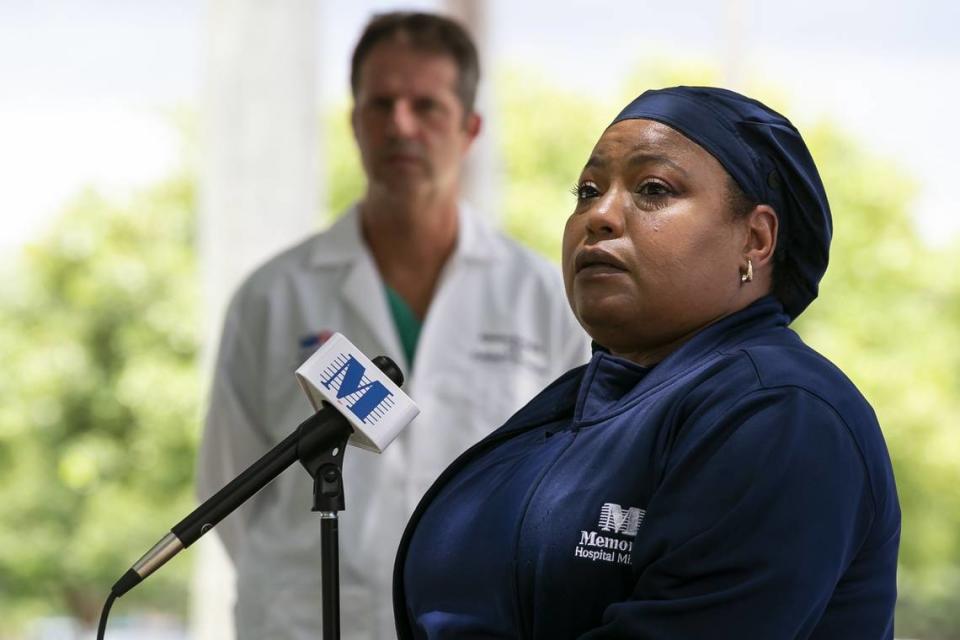As COVID admissions spiral, Memorial Health in South Broward suspends elective surgeries
Elective surgeries at Memorial Healthcare System hospitals in South Broward will be suspended beginning Monday because rising numbers of COVID-19-positive patients have exacerbated a shortage of nurses and created a run on oxygen to treat those hospitalized with the respiratory virus.
“We are seeing a surge like we’ve not seen before in terms of the patients coming,” Dr. Marc Napp, chief medical officer for Memorial Health, said at a press conference on Wednesday.
‘It just went boom.’ ICUs are being overwhelmed with younger — and sicker — patients
Napp emphasized that emergency rooms remain open and that patients with urgent medical needs will continue to be seen and treated at Memorial Health hospitals. But administrators decided to suspend non-emergency surgeries to ensure their facilities have enough space and staff for the still growing number of COVID-related admissions.
Broward Health, the public hospital system for North Broward, has not suspended surgeries, though one of its four hospitals — Broward Health North in Deerfield Beach — has reduced elective procedures to outpatient only, said Jennifer Smith, a spokeswoman.
As of Wednesday, Florida reported more than 12,000 people hospitalized in the state for COVID-19, the third day in a row of record-breaking COVID hospitalizations, according to federal data.
Most hospitals are reluctant to mandate vaccines for workers. That may soon change.
At Memorial Health, the resurgent pandemic differs from the surges in spring and summer 2020 because of the rapid rise in patient admissions and also because many beds are still filled with patients who were hospitalized for reasons other than COVID-19.
More than 1,600 inpatients are currently admitted for overnight stays across Memorial Health’s six hospitals in Hollywood, Pembroke Pines and Miramar, Napp said. Typically, Memorial Health doesn’t have more than about 1,400 inpatients under its care.
“This is the highest number of patients Memorial has ever seen,” he said.
However, Memorial has yet to match the system’s peak of hospitalized COVID-positive patients, which occurred in summer 2020 when the number of inpatients with the disease reached 674 people.
There were 537 people hospitalized with COVID at Memorial hospitals on Wednesday — about one-third of the total inpatient number. Broward Health reported 270 patients hospitalized across the system. Both hospitals reported that more than 90% of patients admitted with COVID were not vaccinated.
At Memorial Health, Napp said he expects the current surge will surpass last year’s high mark.

To make room for the patients, Memorial has added 250 more beds at its hospitals by using non-traditional spaces, including a conference room at Memorial Regional in Hollywood and the cafeteria at Memorial West in Pembroke Pines.
Without those spaces, he said, patients wouldn’t have a place to stay.
But the biggest challenge for Memorial at the moment, Napp said, is staffing patient beds with registered nurses, critical care nurses and respiratory therapists.
“Those are probably the greatest challenge,” he said. “The number of staff that we require is staggering and we are having trouble getting those staffed.”
Memorial Health is bringing in travel nurses from around the country, and paying them premium wages to work at its facilities, Napp said. But because nearly every hospital in Florida is reporting a surge in COVID-related admissions — and because the pandemic is surging simultaneously in other states — Napp said there simply isn’t enough staff available for all the patients.
COVID-positive patients also require a more intensive amount of care than patients hospitalized for other reasons, Napp said. He added that patients hospitalized with COVID-19 in recent weeks are younger than those admitted last summer, but that “early indications” show the severity of illness and the length of time they stay in the hospital is the same.
“It’s the sheer number coming in at the same time,” he said of COVID-related admissions. “There’s only so many beds, so many doctors and so many nurses.”
Napp said that unlike last year, when Florida was under a state of emergency due to the pandemic and the governor issued executive orders allowing for additional resources for hospitals, there is no such structure in place for the state to send staff and supplies.
“We are figuring out exactly what we need to do to manage this,” he said..
Another challenge caused by the number of patients hospitalized with COVID-19 is that most require treatment with high-flow oxygen. Napp said the treatment uses more oxygen than conventional oxygen therapy.
But he stressed that there’s not a shortage, just a rise in demand that is causing “increased stress” on the hospital.
“When you have 500 people in your hospital that are requiring a lot of oxygen, it taxes the system,” he said. “The system is not built to handle that much.”

 Yahoo Finance
Yahoo Finance 